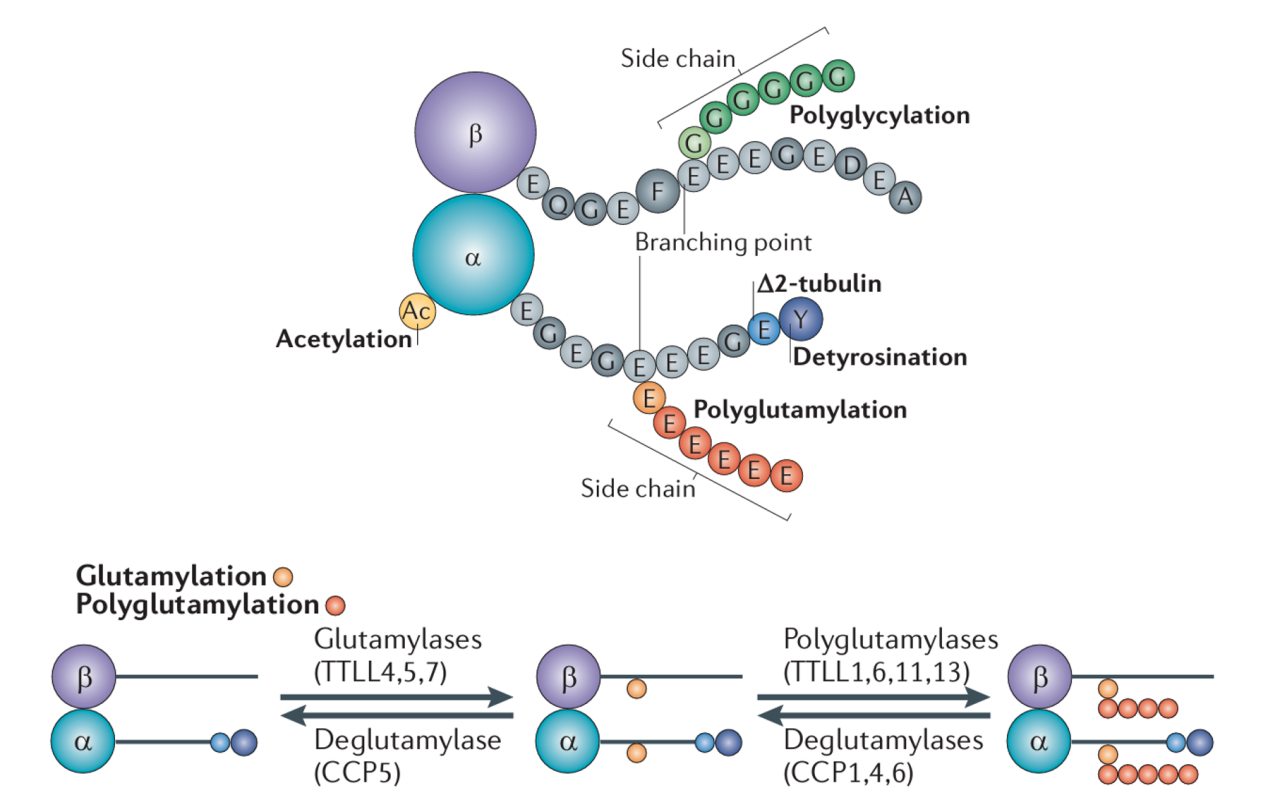Polyglutamylation Analysis Service
Polyglutamylation, a specialized post-translational modification, refers to the sequential addition of glutamate residues to specific protein substrates, most notably tubulin, where it fine-tunes the structural and functional diversity of microtubules. This modification exerts profound effects on intracellular transport, neuronal activity, and ciliary function, and its misregulation has been associated with several pathological conditions. MtoZ Biolabs offers a comprehensive Polyglutamylation Analysis Service.
1. Target Protein Polyglutamylation Analysis
For studies focused on a specific protein, MtoZ Biolabs offers targeted analysis of polyglutamylation to identify modification sites, determine chain length, and assess heterogeneity. Our service uses LC-MS/MS, Western blotting, immunoprecipitation, and antibody-based enrichment to provide precise identification and quantification of polyglutamylation events in proteins such as tubulin and related substrates.
2. Polyglutamylation Proteomics
For broader, discovery-driven research, our polyglutamylation proteomics workflow enables proteome-wide identification and quantification of polyglutamylated proteins. High-resolution LC-MS/MS and HPLC separation techniques, combined with bioinformatics analysis, provide a comprehensive profile of polyglutamylation across complex biological samples, linking these modifications to cellular processes and disease pathways.
What is Polyglutamylation?
Polyglutamylation was first discovered in tubulin, where glutamate side chains are elongated by the sequential addition of glutamate residues. This unique PTM modulates microtubule structure and function by altering the interaction between tubulin and microtubule-associated proteins (MAPs), motor proteins, and severing enzymes. The length and density of polyglutamate chains are tightly regulated and can profoundly influence microtubule dynamics, transport processes, and stability. Enzymatically, polyglutamylation is catalyzed by members of the tubulin tyrosine ligase–like (TTLL) family, which add and extend glutamate chains, while deglutamylases such as cytosolic carboxypeptidases (CCPs) remove them. The balance of these opposing activities determines the functional outcome of polyglutamylation. Dysregulation of this process has been associated with impaired axonal transport, defective ciliary function, infertility, and abnormal tumor progression.

Janke, C. et al. Nat Rev Mol Cell Biol. 2011.
Figure 1. Tubulin Polyglutamylation and Modifying Enzymes
Analysis Workflow
1. Protein Extraction and Digestion
Proteins are isolated from tissues, cells, or biofluids under optimized conditions that preserve polyglutamylation modifications. Samples undergo reduction, alkylation, and enzymatic digestion to generate peptides for downstream analysis.
2. Peptide Enrichment
Antibody-based enrichment and chemical labeling methods are employed to selectively capture polyglutamylated peptides, improving the sensitivity of detection for low-abundance modifications.
3. Detection and Validation
High-resolution LC-MS/MS is combined with Western blotting and immunoprecipitation to achieve accurate identification of modified peptides and chain length determination. This multi-technology approach provides both structural detail and independent confirmation of polyglutamylation events.
4. Data Analysis and Interpretation
Comprehensive bioinformatics workflows are applied for peptide identification, site localization, and modification quantification. Results are integrated into pathway analyses, linking polyglutamylation to cellular function, signaling networks, and disease mechanisms.
Sample Submission Suggestions
1. Sample Types: Cell lysates, tissue extracts, biofluids, or purified proteins. For other sample types, please contact us in advance for tailored preparation guidance.
2. Storage: Store at -80°C; avoid repeated freeze-thaw cycles.
3. Shipping: Send frozen samples on dry ice; lyophilized proteins may be shipped at room temperature.
Service Advantages
✅ Advancement: Polyglutamylation Analysis Service is supported by an advanced analytical platform that delivers state-of-the-art performance.
✅ High Quality: AI-driven bioinformatics analysis integrates proteomics datasets, providing comprehensive and accurate data reports.
✅ Comprehensiveness: End-to-end workflows covering sample preparation, enrichment, LC-MS/MS detection, validation, and functional interpretation.
✅ Professionalism: A highly skilled team of proteomics experts provides technical support and biological data interpretation.
✅ Customization: Tailored solutions designed to meet specific project goals, sample types, and experimental conditions.
Applications
1. Microtubule Dynamics and Regulation
Studying how polyglutamylation controls microtubule assembly, stability, and interactions with MAPs and motor proteins.
2. Neurobiology and Neurodegeneration
Exploring the role of polyglutamylation in axonal transport, synaptic function, and neurological diseases such as Alzheimer's and Huntington's disease.
3. Ciliary and Flagellar Research
Characterizing the role of polyglutamylation in ciliary motility and its dysregulation in ciliopathies and reproductive disorders.
4. Cancer Biology
Profiling polyglutamylation in tumor cells to identify biomarkers and investigate pathways related to cell division, migration, and metastasis.
5. Protein Modification Networks
Investigating cross-talk between polyglutamylation and other tubulin modifications, including acetylation and Polyglycylation, to reveal integrated regulatory networks.
Deliverables
1. Comprehensive Experimental Details
2. Materials, Instruments, and Methods
3. Total Ion Chromatogram & Quality Control Assessment
4. Data Analysis, Preprocessing, and Estimation
5. Bioinformatics Analysis
6. Raw Data Files
Our Polyglutamylation Analysis Service is designed to provide more rapid, high-throughput, and cost-effective analysis, with exceptional data quality and minimal sample consumption. Free project evaluation, welcome to learn more details.







